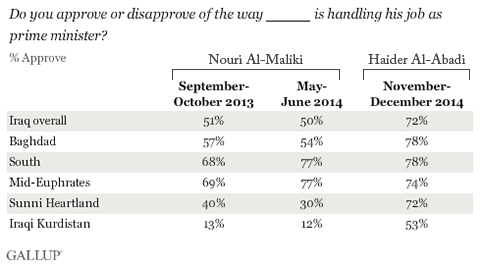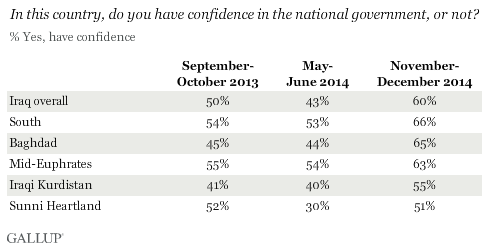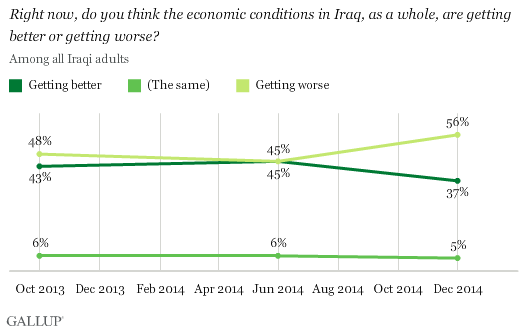Story Highlights
- Increase in approval of Iraqi government among Kurds and Sunnis
- Economic conditions remain a significant concern for most Iraqis
WASHINGTON, D.C. -- Nearly three-quarters of Iraqis (72%) approved of their new prime minister, Haider al-Abadi a few months after he took office in late 2014, substantially higher than the 50% approval rating former Prime Minister Nouri al-Maliki received the previous May. Abadi's approval ratings were sharply higher than Maliki's had been in Kurdish- and Sunni-dominated regions of Iraq, a positive sign for those who are looking to his leadership to help bridge the country's ethnic and sectarian divides.

Abadi's surprising and controversial appointment in August 2014, against the wishes of the incumbent Maliki, came just as the sudden expansion of the Islamic State extremist group threatened the Iraqi state with imminent collapse. Although Abadi comes from the same Shiite-led political bloc as Maliki, his widespread appeal suggests he has maintained support among his main base and that his early efforts to reach out to Iraq's Sunnis and Kurds have earned him some support from those who felt alienated under his predecessor.
Iraqis widely saw Maliki as partisan, and their approval of him followed these same lines. While those in the Shia-majority provinces (South and mid-Euphrates) generally approved of his job performance, few Iraqis in the rest of the country did. For example, just 12% of Iraqis living in the autonomous Iraqi Kurdistan region approved of Maliki's job performance in May, compared with 53% approval for Abadi in December.
Iraqis' Confidence in Government Rises
Iraqis' confidence in their national government in general is also up sharply, increasing from 43% in May to 60% in December. Confidence in the national government rose substantially in all regions, but particularly in Baghdad and the Sunni Heartland. Even in the Shia regions where Maliki had enjoyed substantial support, confidence in the national government has increased with the appointment of Abadi as the prime minister.

Economic Conditions Remain Major Problem in Iraq
Though Iraqis are now more likely to have confidence in their current government, economic conditions remain a significant source of concern. Declining oil prices and the loss of oil revenue from Islamic State-controlled regions have worsened the country's economic outlook over the past year. In late 2014, the majority of Iraqis (55%) thought the national economy was getting worse, while 37% said it was getting better.

Additionally, half of Iraqis said there were times in the past year when they did not have enough money for food they or their families needed (47%) or adequate shelter (50%). The local job market has continued to decline as well, with two-thirds of Iraqis (66%) saying in late 2014 that it was a bad time to find a job.
Bottom Line
The relatively marked improvement in the approval ratings under Abadi a few months after his appointment may be symbolic relief of the political pressure valve under Maliki. But perhaps against the backdrop of the potential disintegration of Iraq, the change in leadership may have renewed some of the hope among Sunni Iraqis that had been scuttled by Maliki and the Islamic State group.
With falling oil prices hurting Iraq's economy and the slow moving if not stalled offensive against the Islamic State group, some might argue that the higher prime minister approval ratings reflect little more than a political honeymoon. If so, more national reconciliation efforts will be needed to create more viable national unity.
Survey Methods
Results are based on telephone interviews with 1,003 Iraqi adults, aged 15 and older, conducted Nov. 12-Dec. 23, 2014. For results based on the total sample of national adults, the margin of sampling error is 卤3.8 percentage points at the 95% confidence level. All reported margins of sampling error include computed design effects for weighting.
Regional findings are derived by grouping Iraq's provinces into the following regions:
Baghdad: Baghdad
Sunni Heartland: Anbar, Kirkuk, Diyala, Ninawa, Salah ad-Din
Mid-Euphrates: Najaf, Babil, Wasit, Qadisiyyah, Karbala
South: Basra, Dhi Qar, Maysan, Muthanna
Kurdistan: Sulaymaniyah, Arbil, Duhok
For more complete methodology and specific survey dates, please review .
Learn more about how the works.

